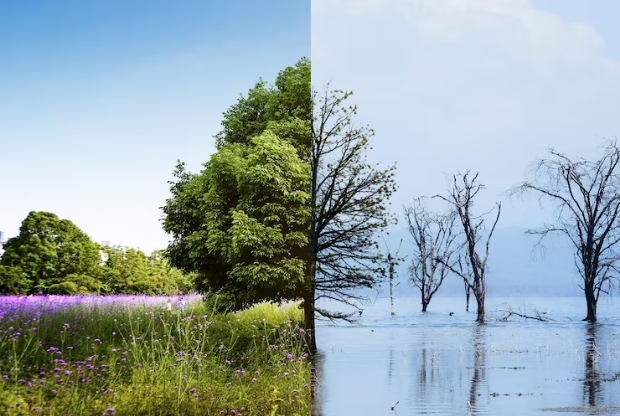
What Is Climate Change?
Climate change refers to the long-term changes in Earth’s climate patterns that occur over a significant period, typically decades to centuries. It involves alterations in temperature, precipitation, wind patterns, and other weather conditions on a global or regional scale. Climate change is a complex and serious issue that affects the entire planet, including Africa.
Causes of Climate Change
Climate change is primarily driven by both natural processes and human activities. Natural factors, such as volcanic eruptions, solar radiation, and changes in Earth’s orbit, have influenced climate throughout Earth’s history. However, the current rapid and unprecedented changes in climate are mainly attributed to human activities, especially the emission of greenhouse gases.
Greenhouse Effect and Global Warming
The greenhouse effect is a natural process that helps regulate Earth’s temperature. Certain gases in the atmosphere, called greenhouse gases (like carbon dioxide and methane), trap heat from the sun, preventing it from escaping into space. This maintains a stable and habitable climate for life on Earth.
However, human activities, such as burning fossil fuels (coal, oil, and gas) for energy, deforestation, industrial processes, and agriculture, have significantly increased the concentration of greenhouse gases in the atmosphere. This enhanced greenhouse effect leads to global warming, which means Earth’s average surface temperature is increasing over time.
Impacts of Climate Change on Africa
Africa is particularly vulnerable to the impacts of climate change due to its reliance on agriculture, limited infrastructure, and dependence on natural resources. Some of the effects of climate change on Africa include:
-
Rising Temperatures: Higher temperatures can lead to heatwaves, impacting human health, agriculture, and water resources.
-
Changing Rainfall Patterns: Climate change can alter rainfall patterns, leading to more frequent droughts or intense rainfall, which can affect food production and water availability.
-
Sea-Level Rise: Melting ice and warming oceans contribute to rising sea levels, which can lead to coastal erosion and increased flooding in coastal regions.
-
Impact on Agriculture: Changes in temperature and rainfall patterns can disrupt agricultural productivity, affecting food security and livelihoods of many people in Africa who depend on farming.
-
Extreme Weather Events: Climate change can result in more frequent and severe extreme weather events, such as hurricanes, floods, and droughts, which can have devastating impacts on communities and infrastructure.
Addressing Climate Change: Addressing climate change requires global cooperation and collective efforts. It involves reducing greenhouse gas emissions by transitioning to cleaner and renewable energy sources, conserving forests, promoting sustainable land-use practices, and adopting climate-resilient strategies in various sectors.
International agreements, such as the Paris Agreement, aim to unite countries and organizations in taking action to mitigate the impacts of climate change and protect the planet for future generations. It is crucial for African countries and communities to be part of these efforts to safeguard our environment, economies, and wellbeing. By working together, we can build a more sustainable and resilient future for Africa and the world.
